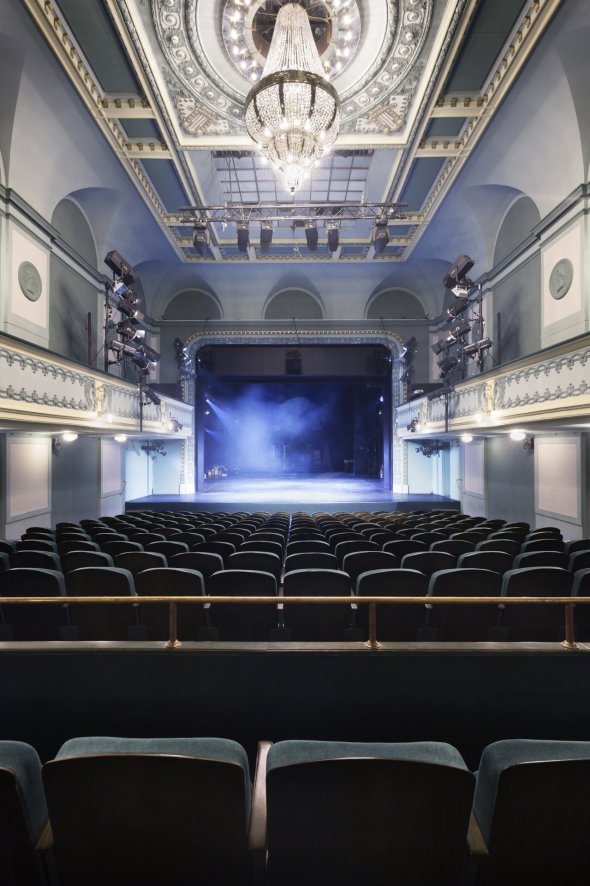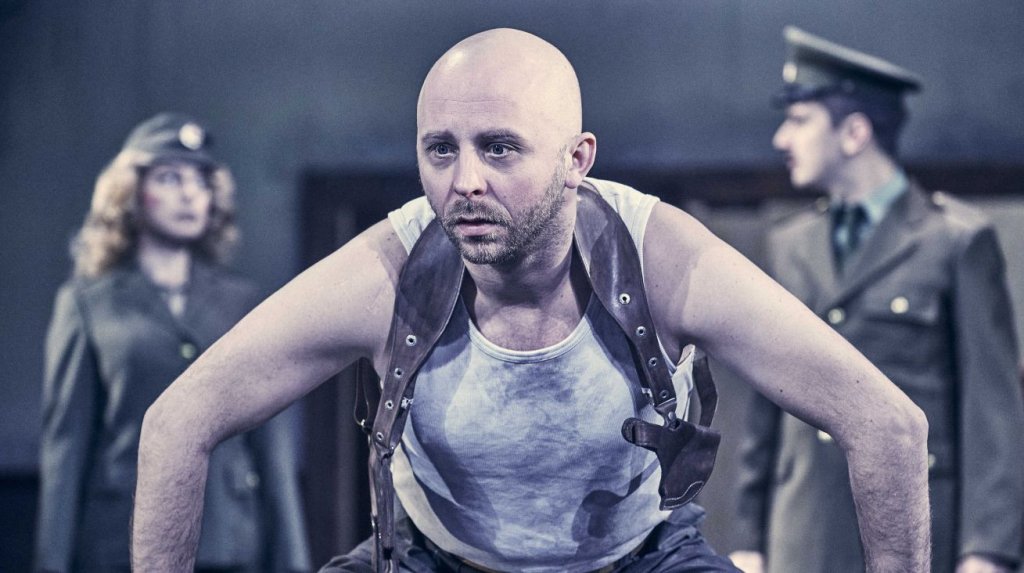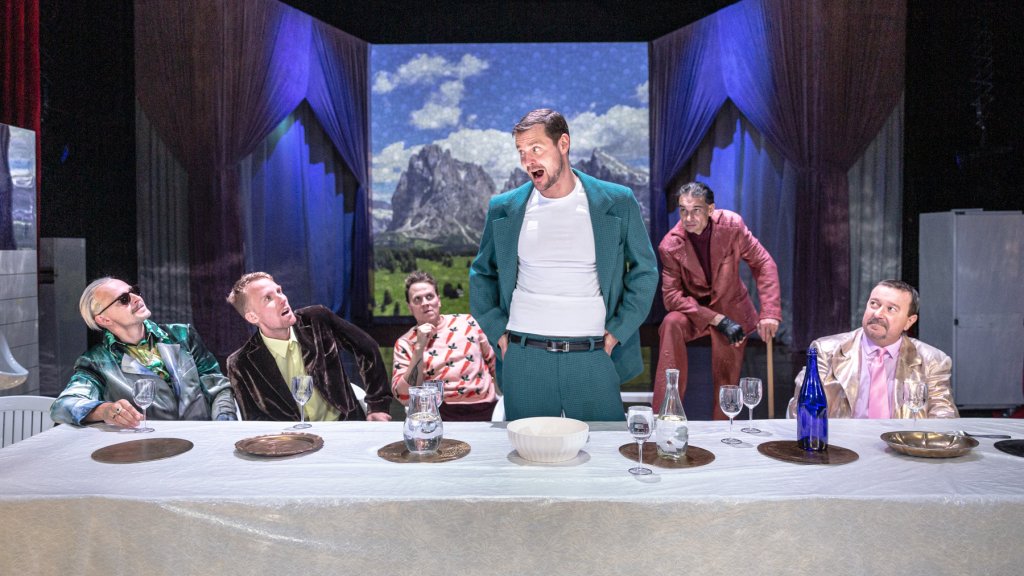18. 1. 2024
On a visit to the Pod Palmovkou Theatre: Interview with Jakub Albrecht
The Pod Palmovkou Theatre [Theatre below Palmolvka] is literally around the
corner from Dock, so it’s no wonder that we consider it to be – a bit
lovingly – “ours”. We share with you regular information about its news
or competitions for tickets, and constantly try to expand our cooperation. Those
of you who have already visited it know that performances, whether they are
unconventionally elaborated classics or generational modernity, are always worth
experiencing. And those who have not yet had the honor may be persuaded by an
invitation from one of the most competent actors of this renowned theater, Jakub
Albrecht.

When the viewer comes to “visit” you for the first time, how do you hope he or she feels when first entering the foyer, settling into the auditorium and waiting for the curtain to raise…?
I would like the viewer to feel like I do here – well, like at home. During the performance, I would like people to forget about the sorrows and reality of everyday life, to relax, but above all, to be personally touched by the theater. Maybe the play reminded them of something, gave them something to think about or perhaps contemplate a change... Even if they didn’t like the play, it doesn’t matter, so for example, a discussion with friends can arise spontaneously, and something happens again... Whether the viewer cries or laughs, it’s still a success for the theater. The worst is when a person leaves the performance unmoved, as if never having been there.
Could you try to guide us “virtually” through the theater? How would you describe the building, the interior, the atmosphere people breathe in here?
At the very beginning, you will encounter a nicely settled theater café, where we offer superb wine, beer and non-alcoholic beverages, so be sure to stop by for handy refreshment. Next, you can go up to our small scene, Palm Off Studio, which can only seat about 80 spectators and has a more intimate atmosphere. The viewer sees far more details, we can technically work with finer expressive elements, actors and actresses don’t have to shout as much and we keep fewer props and things up there. We usually do more pop-cultural pieces there with Tomáš Dianička and Bára Kubátová, a generational theater about issues that concern us all or bother us. Ten years ago, these were, for example, relationship topics, and today it is shifting to children, marital crises and so on... The question is where it will end. (laughs) Or the viewer goes down to the big stage, where we present a bit of something from everyone. We do not really focus on the classics, presenting original historical plays in Elizabethan costumes, but we are not afraid of it either – we just elaborate it a little differently.
Which part of the theater do you like the most? Where do you feel best?
We call it the acting room. I only go to the dressing room to change, but I spend most of my time in this “common room”. It’s a short walk to the stage, we have a monitor to watch what’s going on there, an audio system for the stage manager to call us to go on, and we are all there together. We experience it together, and even if the atmosphere on the stage is dark, we talk, joke around and laugh right alongside one other. What I like most about that room are those who sit there with me.
Will you try to describe your typical pod Palmovkou theatergoer?
We could be described as a kind of regional theater for the inhabitants of Libeň, Vysočany or Karlín, because we aren’t all that close to the center of Prague. But I don’t think our theatergoers necessarily have to be from these city districts. These are primarily folks with a weakness for classics with an opinion or contemporary authorial work. In Tomáš Dianiška’s plays, we tried to make a “theater for the young”, but this is no longer the case, we are not so young anymore... (laughs). So we could say that we are making a generational theater about what interests us, and we believe that it will also resonate with others our age. But really everyone from youth to grandmothers comes to see us.
You mentioned that you elaborate plays a little differently. Which would you choose as the one that maybe distinguishes you from the creation of other theaters?
For me, that would probably be Frankie the Armless, a kind of authorial, collective work with friends, which is what I find most important. I still think I’d probably not take up the role anywhere else – at least in this concept – of Katherina in The Taming of the Shrew. This play is not one of my favorite Shakespeare works, but director Lang ultimately found the key to it: by having the cast made up of men, their perspective of how nice it would have been if women were as they imagine is interesting.
Are you preparing something new for the audience?
In December, we will present the opera The Bartered Bride in an unusual concept... we just had our first reading rehearsal today. It’s a nice “stepping out” into something new for me again. Drama will be doing opera! Director Jakub Krofta claims that it’s a kind of deep probe into the soul of the Czech character. Maybe someone will recognize themselves in this “cynical Czechism”.

What do you consider to be a unique feature that only Pod Palmovkou Theatre possesses, and no other?
For me, it’s just the people, I like to do theater with friends. Of course, you can’t be best friends with everyone in a group of around 18, but for me, it’s important that I get along with everyone, that we can have a beer and not just meet at work, and that we stick together. And that’s probably why I’m not attracted to freelancing, when it is so scattered, you can’t create bonds or harmonize on stage – some act faster, others slower, some are more contemplative, others more instinctive... We’ve grown to know each other so much as years roll on, and I think that the theatergoer will definitely recognize this watching us on stage.
I’m sure you’ve heard it said that you just act all day. Personally, I think that every profession has its positives and negatives. What is it like for you from your point of view?
It’s hard to explain, but the main negative is probably when the creative process fails. Theater works with emotions and every director is different, some are calmer, others are almost hysterical, while still others are like the devil uncaged, and if it does not fit, you just have to endure it somehow. Another thing entering into everything is one’s own ego. When someone tells you that you are doing something completely wrong, you have to walk back that ego a little and tell yourself that it’s not only about you, it’s for the good of the whole thing... Working with emotions is difficult, but on the other hand, I understand that if someone is a cardiac surgeon saving lives every day, what we deal with must really seem superficial to him or her. But when viewers says after the performance that it looked easy and that they could do it too, that’s actually a sign that we got it right, and there’s a lot of work behind it to make it look like this. The positive thing is that I enjoy it. I don’t feel like I go to work, my personal and professional life intertwine, I look forward to coming here and I like it here.
Do you like watching audience reactions? Do you enjoy discussing things with people after the performance, or do you rather like your peace of mind?
Sometimes it is really enough for me to get on the tram after the performance and go home, but other times I like to stop at the theater café and meet people who are full of impressions of what they’ve just seen. They’re usually like me after I’ve seen a play that I really liked. I want to tell the actor or actress that it was great and that it touched me. But at the same time, I would like people to come up to me even if they didn’t like it at all and give me some constructive criticism. Of course, interaction also occurs during the performance, the actors hear, see and perceive whether their activity affects people. Sometimes we say to ourselves behind the scenes that “up front”, it looks like no one is there today, which doesn’t mean that someone is doing something wrong, but it’s possible that the viewers are just in a different mood. Other times you hear someone chuckle or exchange a quiet comment, and we immediately know that the audience perceives us. At the Taming of the Shrew, it often occurs that outbursts of joy come from the audience, especially from women. They feel that we have portrayed some of the scenes just right. (laughs)

How do you enjoy acting roles whose characters are not quite “normal”? When I saw The Taming of the Shrew as you mentioned, in which you played Katherina, I was absolutely convinced. Was it difficult for you to tune in to our feminine world?
I believe it varies a bit with every actor. I approached the role of Katherina from the movement side. Even when you put on women’s dresses and heels, your posture changes. At the same time, I try to make more subtle movements and expressions, glances that can mean “now he will either kill me or fall in love with me”, and so on. In my opinion, it’s true that women and men are like from two separate worlds. I hope I’ve embodied the woman just a touch, but at the same time, I’m glad that she still remains a mystery to me.
Do you have a dream role?
Maybe something we could take around the world, without language barriers – I used to do a lot of street acrobatic theater, so maybe go back to something like that. In my opinion, all nations engage a bit in acting, so I’d like to know what the audiences are like and what types of theater are found elsewhere. In fact, I find that when I get a good role, I retrospectively say that it was probably my dream all along, what I wanted to do, I just couldn’t put my finger on it.
And finally: What would you like to wish theatergoers and magazine readers in the New Year?
I think it’s essential to have people around us whom we like and who like us. I wish all readers to cultivate and protect quality, friendly interpersonal relationships.
Thanks for the interview.